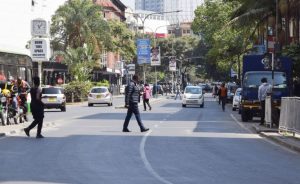Cameroon: From Refugee to Entrepreneur – the Inspiring Journey of Haphizou Amadou Aziri

In the heart of University of Yaounde 2, the fragrant aroma of fried eggs and spaghetti known locally as “deux oeufs spaghetti” draws students and locals alike to a vibrant cafe restaurant. Here owner Haphizou Amadou Azari, former refugee turned thriving entrepreneur exemplifies the resilience, fostered by UNHCR and its partners, in providing lasting solutions through education and livelihood initiatives.
In 2014, Haphizou fled the Central African Republic (CAR) for his life, seeking refuge in Cameroon. Upon arriving in Cameroon and witnessing the daily struggles his family endured to survive, he quickly realized that education was the key to building a better future. Despite the overwhelming financial and emotional challenges, his determination to become an economist and lift his family out of poverty only grew stronger. That determination led him to the DAFI (Albert Einstein German Academic Refugee Initiative) scholarship, managed by UNHCR. This support proved pivotal, enabling him to pursue studies in Political Science and Management.
“When I arrived in Cameroon in 2014, neither my parents nor I had the means to afford my studies, but thanks to the support of the DAFI program today, I’m at the peak of my knowledge,” Haphzou says.
Today, having transformed his life through education and business, Haphizou is turning his dreams into reality by launching a successful café restaurant at the University of Yaoundé 2 in Soa, Cameroon. This achievement was made possible thanks to flexible funding from countries like Germany, which play a crucial role in enabling refugees like Haphizou to build their competencies and create better futures for themselves and their families.
Inside the café, groups of friends and students gather, their faces lit with excitement as they share laughter and ideas. Outside, others eagerly wait to be served golden fried and well-seasoned spaghetti and eggs, a comforting start to their day. For many, this is more than just a place to eat. It is a sanctuary where hopes are built, and dreams are nurtured.
“The majority of our clients are students from the university, but we also serve the local community. People from Soa often come here for breakfast,” Haphizou explains.
Loyal customers like Maeva Sangu a student in Economics and Management praise the clean environment, well-prepared food, and exceptional customer service. “I absolutely love eating here, the environment is clean, and their food is impeccable and affordable If it were up to me, I would eat here every single day with no problems”. ”
Balancing education and business were no easy task for Haphizou. With over six years of experience, he realized the importance of delegating responsibilities and supporting others, especially those from vulnerable groups. He employed three workers, including Moussa Idrissou, an internally displaced student from the Northwest region. Moussa, who fled to Yaoundé in 2018, now works at the restaurant, hoping to save enough money to return to school.
Haphizou serves fried spaghetti and eggs at his cafe restaurant.
© UNHCR/Ruth Mbendong Haphizou’s commitment to helping others not only fosters a sense of community but also ensures the sustainability of his restaurant. By offering employment and support to individuals like Moussa, his business demonstrates the power of a community-based approach to overcoming adversity.
“UNHCR supports us, but as young people in general, and refugees in particular, the fact that life isn’t easy doesn’t mean we should give up. We must dare, we must create jobs ourselves and tap into our own potentials,” Haphizou affirms.
His dream extends beyond his restaurant. He aspires to become a practical economist who trains others to boost economic development in Africa. This aligns with the goals of the Central African Republic Solutions Support Platform (CAR-SSP), which aims to provide durable solutions, and ensure socio-economic opportunities for CAR refugees, emphasizing on the importance of education, employment, and community integration.
By fostering these opportunities, Haphizou’s journey not only highlights personal resilience but also underscores the regional efforts to support and empower refugees.
Despite success stories like Haphizou’s, needs remain high. In Cameroon, 47% of the over 413,000 refugees face challenges in accessing quality education and a significant number of refugees being unemployed or engaged in low-income and informal occupations.
Continued funding to address these needs are crucial to ensure that forcibly displaced people receive the required support.
By UNHCR



